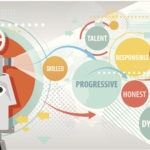Emotional Intelligence: What is it, and how can it transform your career?
If the perfect worker could be made from a recipe, you would not be alone in expecting intellect to be the most important ingredient. It is the smart kids who grow up to be top performers. At least, that’s what conventional wisdom tells us.

But decades of research point to the conclusion that, in this case, conventional wisdom is wrong. A superior intellect does not necessarily equate to better performance. 70% of the time, people with average IQs outperform those with the highest IQs. It is not that intellect is unimportant – but there is more to high performance than intellect alone.
The emergence of a new performance-driving mental quotient adds weight to the argument. Emotional Intelligence, or EQ, is the power to discriminate between different feelings, to label them appropriately, and to use the emotional information you gather to guide your thinking and conduct. It is also a key mechanism of adaptation: if you have ever found yourself adopting a more expressive tone when talking to children, or eating food with more care on a first date than you would when home alone, you will have been using your EQ to do so. Without it, you would not be able to manage and adapt your instinctive behaviours or the way in which you publicly react to social complexities.
A recent TalentSmart study found that 90% of top workplace performers score highly in emotional intelligence. Their research suggests you can be a top performer without emotional intelligence (i.e. on intellect alone), but it’s unlikely. People with high EQ make $29,000 more per year than those with low EQ, and every point increase in emotional intelligence adds $1,300 to the annual salary. These findings are universal – they account for workers in all industries, at all levels, in every region of the world.

So – why does emotional intelligence improve performance? There are many factors. Principally, workers with high EQ are better able to work in teams, lead projects and adjust to change. They enjoy better social relations with colleagues and in negotiations, and are constantly looking for ways to improve the work they do. Emotional intelligence is essentially a powerful combination of behaviours. Developing EQ is therefore one of the smartest and most efficient career strategies you can employ. To boost overall EQ, psychologist Daniel Goleman outlines five pillars across which people should look to build competency.
1. Self-awareness: If you can develop a healthy sense of self-awareness, you will better understand your strengths and weaknesses, as well as how your actions affect others. This will enable you to continually evaluate your performance and identify areas that require improvement.
2. Self-regulation: Being able to reveal your emotions in a mature manner and exercise restraint in high pressure scenarios is key to your EQ. Instead of bottling up your feelings, you should try to express them with restraint and control.
3. Motivation: Emotionally intelligent people are self-motivated – they want for things beyond money and status. To become self-motivated is to become resilient and optimistic in the face of disappointment; by measuring your success from an inner ambition, rather than a material one, you find it easier to overcome setbacks.
4. Empathy: Empathy is compassion, and understanding of human nature. Developing it allows you to connect with other people on an emotional level and respond genuinely to their concerns.
5. People skills: People who are emotionally intelligent are able to build rapport and trust quickly with others, on their teams and beyond. If you can learn to enjoy rather than tolerate people, and respect them even if you disagree with their opinion, it is more likely you will be trusted in the high-risk, high-pay roles that require a flair for diplomacy.

In today’s global, technologically-enabled business world, emotional intelligence is more important than ever. The high performing 21st century professional works across borders, languages and cultures, and is capable of continuously adapting their understandings – both of themselves and of the world around them. They know that success is a process of self-improvement, not an end. They know, more than anything, that there is no such thing as a ‘perfect worker’.
At BBVA we place emotional intelligence at the centre of everything we do; during our interactions with customers, employees and society alike. If you’d like to learn more about life and career opportunities at a company that is leading the way for 21st century banking, please visit BBVA Careers and follow us on LinkedIn.